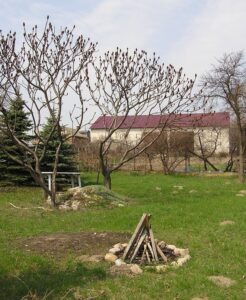Safely Enjoying Campfires & Bonfires
As the weather warms up, backyards and camp sites come alive! Priceless memories can built around campfires and who doesn’t have some favorite variation of s‘more! Whether you’re planning to add a fire pit, or even if you already have one, it’s especially important to make sure you’re safely using it. Follow these safety tips and enjoy the great outdoors!
Materials:
- Shovel
- Rake
- Bucket of water
- Kindling, tinder, and logs
- Stones to ring the fire pit
Choosing and preparing the space:
- Call your local fire department to make sure that fires are allowed where you plan to have one. They’ll probably have some specific guidelines of their own to add.
- Choose level ground.
- Choose a spot at that is at least 10-20 feet from any of structures (houses, sheds, fences, decks). Some fire departments require that it be at least 30’ from habitable structures. The further, the better!
- Makes sure the area is clear of debris, dead or dry brush, rotten stumps, leaves, pine needles, and tall grass.
- Depress the center of the area where the fire will be built and surround it with a ring of rocks.
Burning:
- Only use untreated, dry paper and wood-based materials.
- Chop wood in short lengths.
- Always keep a shovel and bucket of water handy.
- Wear fitted clothing opposed to loose, flowy pieces.
- Never leave the fire unattended. An adult should be present at all times.
Extinguishing:
- Drown the fire with water
- Stir the doused fire with your shovel to make sure everything gets nice and wet. Coals and wood should be wet on all sides. Add some more water and stir again.
- Use the back of your hand to feel all around the area and make sure all embers are fully extinguished.
- Smother it by shoveling some dirt onto it and mixing it up.
Share your set-up with us on Facebook!



